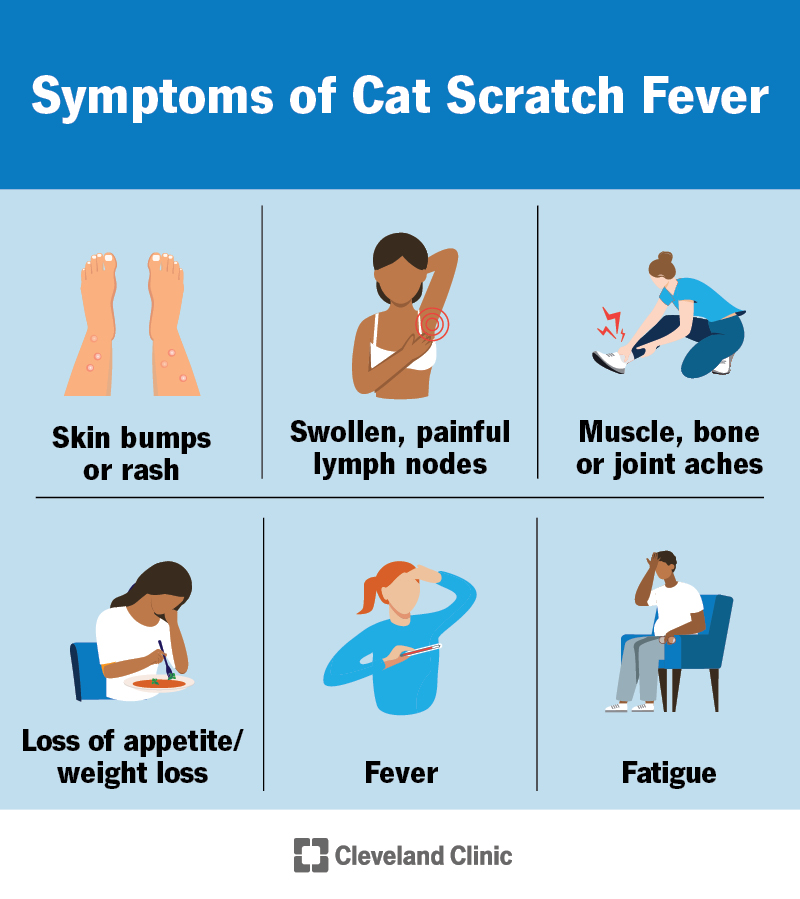Cat Scratch Disease
Overview

Cat Scratch Disease
What is cat scratch disease?
Cat scratches and bites can cause cat scratch disease, a bacterial infection carried in cat saliva. Research suggests a cat may get these bacteria from fleas. The bacteria are passed from an infected cat to a human after the cat licks an open wound or bites or scratches human skin hard enough to break the surface of the skin. Kittens younger than one year of age are more likely to scratch, increasing the likelihood of infection.
What causes cat scratch disease?
Cat scratch disease is caused by a bacterium carried in the cat saliva. The bacteria are passed from an infected cat to a human after the cat licks an open wound or bites or scratches human skin hard enough to break the surface of the skin.
Who is at risk for cat scratch disease?
Factors that can increase your risk for getting cat scratch disease include:
- Being around cats on a routine basis, especially kittens that are more playful and apt to accidentally scratch you
- Not cleaning scratches or bites from a cat as soon as you get them
- Allowing a cat to lick any open wounds that you have
- Being around a flea infestation
What are the symptoms of cat scratch disease?
These are the most common symptoms of cat scratch disease:
- A cat bite or scratch that becomes reddened or swollen within a few days and does not heal or worsens over time
- Painful or swollen glands, especially under the arms (if scratched on the arm or hand), or in the groin (if scratched on the foot or leg)
- Flu-like symptoms including headache, decreased appetite, fatigue, joint pain, or fever
- Body rash
The symptoms of cat scratch disease may look like other conditions or medical problems. Always see your healthcare provider for a diagnosis.
How is cat scratch disease diagnosed?
Diagnosis is based on a complete history, including a history of being scratched by a cat or kitten, a physical exam, and sometimes blood tests.
How is cat scratch disease treated?
Your healthcare provider will figure out the best treatment based on:
- How old you are
- Your overall health and medical history
- How sick you are
- How well you can handle specific medicines, procedures, or therapies
- How long the condition is expected to last
- Your opinion or preference
Treatment may include:
- Antibiotics (to treat the infection)
- Caring for the symptoms that result from the infection. In most cases, no antibiotics are needed, and the infection will clear on its own.
What are the complications of cat scratch fever?
Most healthy people don’t have complications from cat scratch fever. However, people whose immune systems are weak (such as those who have HIV/AIDS, are receiving chemotherapy, or have diabetes) can have complications such as:
- Bacillary angiomatosis. A skin disorder characterized by red, elevated lesions surrounded by a scaly ring. This condition may become a more widespread disorder that involves internal organs.
- Parinaud's oculoglandular syndrome. A condition that involves a red, irritated and painful eye similar to conjunctivitis (pink eye), fever, and swollen lymph nodes in front of the ear on the same side
Can cat scratch disease be prevented?
Avoid being scratched or bitten by cats or kittens. If scratched or bitten, wash the area right away with soap and water. Do not allow cats to lick wounds you may have.
When should I call my healthcare provider?
If a cat scratch or bite becomes red or swollen and you develop flu-like symptoms, including headache, decreased appetite, fatigue, joint pain, or fever, contact your healthcare provider.
Key points about cat scratch fever
- Cat scratch disease is an infection caused by a bacterium in cat saliva.
- The disease causes redness and swelling at the site of a cat scratch or bite, and flu-like symptoms.
- If you are scratched or bitten by a cat or kitten, it is important to promptly wash the area with soap and water.
- Cat scratch disease can be treated by antibiotics.
Αυτές οι πληροφορίες προορίζονται για γενική ενημέρωση του κοινού και σε καμία περίπτωση δεν μπορούν να αντικατστήσουν τη συμβουλή ιατρού ή άλλου αρμόδιου επαγγελματία υγείας .
This information is intended as a general guide only and not to provide specific information for individual patient care. Any questions about your own situation should be directed to your medical practitioner.
Pediamed,Pediamed4u,Pedialine,Dr.Nikos Konnaris
SOURCES: Νίκος Περσιάνης παιδίατρος,CDC,Medscape,WebMD, Cleveland Clinic


Δεν υπάρχουν σχόλια:
Δημοσίευση σχολίου